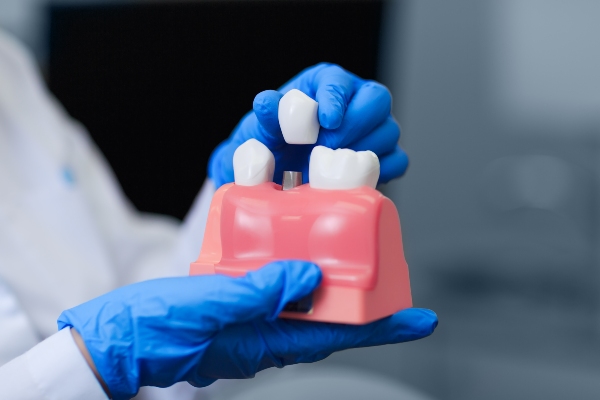What to Know Before Full Mouth Reconstruction Procedures

Full mouth reconstruction is a personalized treatment plan that involves a series of procedures that treat different dental problems.
The type and number of procedures that an individual needs will depend on the state of their teeth, gums, and jaws. For example, severe oral health issues usually require time and several treatments to resolve. In contrast, a person with cosmetic-level issues will only need a few minimally invasive procedures.
Full mouth restoration needs an investment of time, energy, and finances on your part. So, it makes sense to learn all that you can about full mouth reconstruction before you take the leap.
How full-mouth reconstruction resolves oral health issues
No two full-mouth reconstruction treatment plans are the same because no two patients have the same needs. That said, there are commonalities among most treatment plans. The procedures that dentists use for full-mouth reconstruction fall into the following broad categories:
- Use of dental restorations like fillings and crowns to repair teeth
- Periodontal treatment to control and/or reverse gum disease
- Orthodontic treatment to correct a bad bite
- Corrective jaw surgery to treat jaw deformities
- Oral surgeries to install dental implants and bone grafts for patients with missing teeth
- Use of cosmetic treatments to improve the appearance of the teeth and mouth
Suppose that patient is dealing with tooth decay and missing teeth because of gum disease. A dentist will craft a treatment plan that treats tooth decay as a matter of urgency. This preserves the remaining teeth as the patient undergoes treatment for gum disease.
When the dentist brings the periodontal disease under control, they will replace the missing teeth. They will conclude treatment by removing surface-level imperfections in the remaining natural teeth.
Different stages of full-mouth reconstruction
The road to full mouth restoration starts with an evaluation via a visual exam. The dentist will evaluate the patient's teeth, gums, jaw, and bite. They will compare their observations to the patient’s dental records. The dentist will also request X-rays and other kinds of medical imaging if needed.
Next, the dentist will use the information that they gathered to craft a custom treatment plan. The plan will comprise a series of procedures that the dentist schedules over a period of time. This plan will have allowances for recovery time.
Where possible, the dentist will arrange for two procedures simultaneously. This happens in scenarios where an oral surgeon combines a bone graft and dental implant surgery into a single procedure.
The final phase of full mouth reconstruction is the monitoring phase, where the dentist keeps tabs on their patient’s oral health. This phase takes the form of routine dental visits that happen at least twice a year.
Preparation
Each procedure has its own requirements when it comes to preparation, but there are standard measures that patients need to take.
Sometimes an individual has to start or discontinue certain medications in the days leading up to the procedure. The person also has to arrange for time off to recover. This includes getting chores and errands out of the way.
People with kids need to make childcare arrangements if they expect to undergo an intensive procedure. They also have to arrange for transport to and from the dentist’s office. Last of all, the person has to stock up on medication, cold packs, and soft foods for the recovery period.
Aftercare and recovery
In broad strokes, recovery involves rest, pain management, diet modifications, and good oral hygiene. Dentists can advise patients on aftercare depending on their unique circumstances.
A dentist will also detail a list of symptoms that point to a postoperative complication. They will advise their patient to seek immediate help if they experience any of the symptoms.
Make a healthy smile your new reality
Our team has expertise across different specialties of dentistry, which enables us to craft effective custom treatment plans. Get in touch with us to talk with a staff member and book a consultation with the dentist.
Request an appointment here: https://metrosmiles.com or call Metro Smiles Dental at (718) 841-9591 for an appointment in our Forest Hills office.
Check out what others are saying about our dental services on Yelp: Full Mouth Reconstruction in Forest Hills, NY.
Recent Posts
Your smile can be flawless with proper dental hygiene at home and our cosmetic dental care.When it comes to a smile, there are certain aspects that brushing and flossing can't change. While proper oral hygiene is essential for one's health, cosmetic dental care offers a variety of procedures to enhance the appearance of one's teethWe…
Don't let dental problems get in the way of having the perfect smile, seek cosmetic dental care today.Cosmetic dental care allows patients to receive the dream smile they've always wanted. You can enhance your smile in a variety of ways for a healthier and better lifestyle. For those searching for a whiter smile, a cosmetic…
A cosmetic dentist can bring back your radiant smile even after years of damage or decay. Different procedures can make this possible. Understanding which one will fit your dental needs can help you make informed decisions. Here are the different ways your cosmetic dentist can improve your smile.A person’s daily diet and lifestyle choices can…
Cosmetic dentistry includes procedures that improve the appearance of your smile. Cosmetic dentists focus on oral health to provide patients with a proud smile. Some cosmetic procedures may include veneers, teeth whitening, dental implants, teeth shaping, and crowns. Cosmetic dentistry may change the shade, shape, or alignment of a patient's natural teeth.Many people believe cosmetic…


